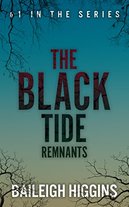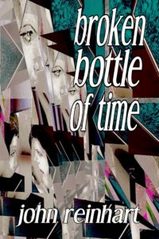 One of my greatest joys about being a book reviewer is finding writers who are new to me. John Reinhart is a poet whose work is fun and funny, in addition to being serious and thoughtful. His writing mixes the speculative genre with literary, humor with pathos. I read Mr. Reinhart's latest collection of poetry, broken bottle of time, and enjoyed it immensely. The full review of it was published today at Bewildering Stories, and you can read it here, along with some excerpts from Mr. Reinhart's work.. I hope you enjoy reading broken bottle of time as much as I did! 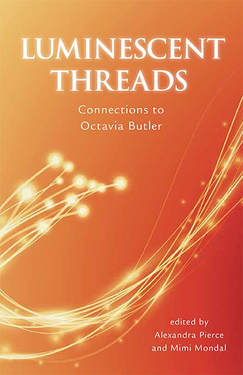 Mithila Review is a beautiful journal that celebrates international speculative fiction. Printed quarterly, it's based in Asia, and it has quickly gained a reputation as a leading voice in Asian science fiction and fantasy. It has been noticed by such publications as Wired, Strange Horizons and the Science Fiction and Fantasy Poetry Association, including one of its published poems being nominated for a Rhysling Award. This latest issue of Mithila features women of color in science fiction, so it's definitely a great issue to check out. While you can subscribe, it's also free to read online. I am thrilled to have a book review included in Issue # 9 of Mithila Review. I reviewed Luminescent Threads: Connections to Octavia E. Butler, edited by Alexandra Pierce and Mimi Mondal. This one was near and dear to me, as I have been a lifelong fan of Ms. Butler and it was wonderful to read how many others have been touched by her work and continue to be to this day. So please check out this wonderful magazine, read my review of a work honoring Ms. Butler if you feel so inclined, and take a look at Luminescent Threads, a truly inspiring book. 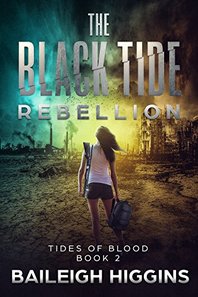 I recently finished reading The Black Tide: Rebellion (Tides of Blood, Book 2) by Baileigh Higgins. I did a full review of Book 1: Remnants at Bewildering Stories, which you can read here. I was also so excited by the first book that I asked Ms. Higgins if she'd do an interview with me, and she was kind enough to agree. You can read the full interview with her here. Now, let's dive into Book 2 of the series. Almost everyone else is gone after a deadly disease called The Black Tide has swept across the world. In the first book, the disease was passed manually from victim to victim when in close proximity to someone who was sick - sort of like the flu. The way to avoid contagion was wearing a mask and avoiding contact with bodily fluids. But the first book closes on a horrible mutation of the sickness, which makes it airborne. The survival strategies of hiding from the disease become useless, and the second wave of The Black Tide wipes out nearly everyone. Ava, her younger sister Lexi, and two acquaintances of theirs are four Immunes, who remain untouched by the disease. But with death surrounding them, they flee their hometown of Riebeeckstad to a remote cabin owned by her ex-boyfriend's family. Ava's still in love with Brian, her ex-boyfriend. They had a brief romance during the first phase of the disease, but he's a soldier, and he was sent to guard the border of South Africa before the second wave hit. Yet she still hopes against hope to see him again, although she knows it's highly unlikely he survived. Immunes are fairly rare. Yet in Book 2, the reader anticipates a reunion between the two of them. Brian does survive the second outbreak, and he is traveling back from the border with two fellow soldiers, everyone else having perished. His only mission is to find Ava again. Ava, meanwhile, is just trying to survive. She meets four other Immunes when she makes a supply run to the nearby town, and she's unsure whether she can trust them or not. Her decision could be the turning point of her life, and might lose her the hard-won peace that she's found with her friends and family at the cabin. Although Book 2 is a bit slower, action-wise, than the first book, I really enjoyed the slow build of tension. As a reader, you just know something's about to hit the fan. And the ending of the book doesn't disappoint, being as much of a cliffhanger as Book 1. I went to turn the page and - darn it! - there wasn't any more. Book 3: Vanquish will be available in October - and I can't wait to see what happens next (although I'll have to!). If you're a fan of apocalyptic fiction, this is a great series to pick up. I'd definitely recommend it. 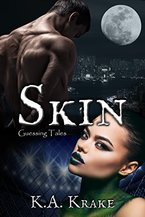 Although I've been reading this genre all my life, it wasn't until recently that I heard the term "science fantasy," which is the mashup of science fiction and fantasy. So think magic and machines, unicorns and space ships. It can be a lot of fun to cross the boundary that separates the two, since I feel that science and magic should, actually, be similar. Just like science follows rules, magic should have rules, too. I'm not a big fan of: "And then there was magic, so it solved everything!" Nope. Not for me. But I digress. If you want to take a look at a fun new science fantasy mashup, turn to Skin by K.A. Krake. Although it's the fourth book in the series, I didn't feel like I was deprived by jumping right in. You can read a full review of it here at Bewildering Stories. I hope you enjoy reading Ms. Krake's impressive world building as much as I did.
I was interested in reading Piers Anthony’s new book, Writer’s Retweet, for several reasons. He was one of the authors I grew up with, and I’m always curious to come back to a writer that I’ve read years ago and see if my understanding of their work offers anything new. I’m also always looking for work that expands my understanding of the creative form, and the concept of this book was intriguing. Every author hears over and over that social media is a key component of today’s writer’s platform, and Mr. Anthony came up with the idea of doing a story in tweets, which would run over the course of many months. Writer's Retweet is a compilation of five of these Twitter stories.
There's a full review over at Bewildering Stories - I hope you find it informative! I've often enjoyed reading the anthologies by Third Flatiron, often edited by publisher Juliana Rew. In fact, I had a story published by them a couple years ago in Abbreviated Epics. So I started to read their new anthology, Hyperpowers, with anticipation. It was guest edited by Bascomb James, and the theme of the book was space opera and military SF stories, genres I've enjoyed since reading Heinlein when I was a kid.
I have a full review of the anthology published at Bewildering Stories magazine. Layden Robinson's The Boston Ranter: Slanted Vignettes from a Native New Englander are short stories, mostly flash fiction, written in a stream-of-consciousness humorous style about growing up and living in blue collar Massachusetts. There are a few detours into magical realism and science fiction, but the stories are mostly written as fiction or creative nonfiction. Sprinkled with swear words and drug references, often written with a nod to the Boston vernacular ("h"s instead of "r"s) it reads like the stories you'd hear sitting down at a bar to drink a pint with a friend.
It's been a while since I've read a good science fiction book or a collection of short stories, and so I was happy to open up Third Flatiron's new anthology, The Time It Happened. There are fifteen short stories in the collection with an eclectic variety of styles. Some are told with a rich, poetic language, some in modernistic terms, and some harken back to classic tales from the golden age of science fiction, so there is really something in this anthology for everyone.
In the feature story, "False Footfall" by Martin Clark, the protagonist is diagnosed with Temporal Psychosis after prolonged exposure to radiation through his job - which means he has a different understanding of the past than everyone else. Or is he right about the past and everyone else wrong? This was less a style of story that drew me in, as I felt the action moved a little too fast for me – one of the problems when reading a short story rather than a longer piece. But an interesting idea. "Lincoln's Watch" by Atar Hadari is fascinating and poetic. It details a man, Joe, who is obsessed with President Lincoln's pocket watch to the exclusion of all else in his life. One of my favorite stories of the collection. "Going Viral" by Dan Koboldt is a real page-turner of a story about a miracle virus that cures cancer, and follows the lives of the scientists who discover it. Another favorite story of the collection for me, with a dose of humor running through it that made me smile. Ellen Denton writes about a world stopped in "Stilled Life," and the few people who are remaining to figure out the mystery. I especially liked how there are a series of vignettes strung together at the beginning of the story to show the universal nature of the problems the protagonists face; I felt it worked really well to show the reader the set-up of this alternate reality. In "Kin Carriers," Jason Lairamore shows the reader the destruction of a space colony by a military ship sent from Earth. But does the one survivor have a last message of hope for the captain? Like the intro story, I felt this one was too brief for me – I would have liked to see more. In a heartless city where only the strong survive, Yvan has lost both his mother and brother. But Larry C. Kay's "What Was Lost" shows the reader that death isn't always the ending it is supposed to be. I liked the decided change of tone in this story compared to the others – much darker, yet with a hopeful message. Richard Mark Ankers' "Armada of Snow" reveals a post-apocalyptic world in which Earth has already survived one alien invasion. When the alien ships fill the horizon for a second time, will it mean the end of the world? The tone of this one takes me back to classic sci-fi, Twilight Zone era. "Puppy Love" by Thomas Canfield is filled with Russian spies, the FBI and a major international conspiracy… or perhaps only two kids in love? What would happen to all of us if the world's coffee supply suddenly disappeared? "Good to the Last Drop" by Wendy Nikel explores that concept in an exaggerated doomsday world without our most beloved beverage. I got a good chuckle out of the silliness of the idea of a world without coffee used as a serious idea – a good juxtaposition. "With Gilded Wings" by Evan Henry is a beautifully told story about alien whales that fly through space, reminiscent to me of one of Bradbury's short tales. Another favorite of the anthology for me. Elliotte Rusty Harold's tale, "Net War I" talks about the new frontier of war, which is fought through technology and intellect instead of on the physical plane. This tale has a more modern feel to me, with a tone that reminds me of the writing of Charles Stross. A combination of alternate history, science fiction and love story, "A Rock in the Air" by Neil James Hudson is a tale that will linger with the reader. Definitely one of my favorites, if not my absolute favorite of the anthology, it's a story about Hideyoshi Kita, who miraculously survives the atomic blast at Hiroshima. But he learns, in the end, that there are many different types of survival, and perhaps living with the mistakes of his life choices isn't enough. I love this story and will definitely look out for more by this author. A silly and fun story, "Blargnorff Industries New Employee Handbook Human Edition" by Dana Schellings makes any other job choice look positively wonderful by comparison. I got another chuckle out of the "The Zzzombie Apocalypse" by Mark Hill, which makes one wonder – what if the zombie apocalypse wasn't all that bad, but only hyped up by mainstream media? "Xenofabulous" by Amanda C. Davis is a unique take on alien contact and how it would influence human culture. Another fun flash fiction piece to end the book. This anthology offers up a great mix of stories in a variety of styles, enough for any fan of science fiction. Some are more hard science fiction, some on the softer science side. I had a few particular favorites and a couple that weren't to my tastes, but overall the quality of this anthology was very high and I really enjoyed the read. I would recommend it to any fans of science fiction short stories. I recently finished one of the best books I have read in a while. I like a good apocalypse as much as the next person - I'm a fan of The Walking Dead, for example - but those types of stories are easy to over-dramatize and throw in lots of violence or dystopia for the sake of violence or dystopia. But to have a good apocalypse tale that reveals the heart of humanity, while not showing it completely rotten or saccharine sweet, is a wonderful and unexpected change.
The book opens with a famous actor, Arthur Leander, having a heart attack on stage while playing King Lear. Jeevan Chaudhary, a budding EMT and member of the play's audience, leaps on stage to do what he can to help. Caught up in this small but important drama to them, little do they know that a deadly flu is taking over the city of Toronto. Soon, one person's medical crisis becomes irrelevant when faced with a medical crisis for the entire world. The book leaps backwards and forwards in time, so the reader slowly learns the reasons and backstory of what led the characters to the opening scene. The transitions are smooth instead of jarring, and the beauty of the tale is woven out of these time shifts into a bittersweet story that gives the reader pause, without becoming maudlin or pandering. I won't reveal more for fear of spoilers, but this book was very hard to put down at all. I would definitely recommend it. |
Book ReviewsI read a lot - depending on my writing schedule, I can usually read about a book a day. Some of the books are fantastic and I would love to recommend to everyone - some, not so much. Either way, I thought I would share a few thoughts on what I'm reading at the moment. Categories
All
|

